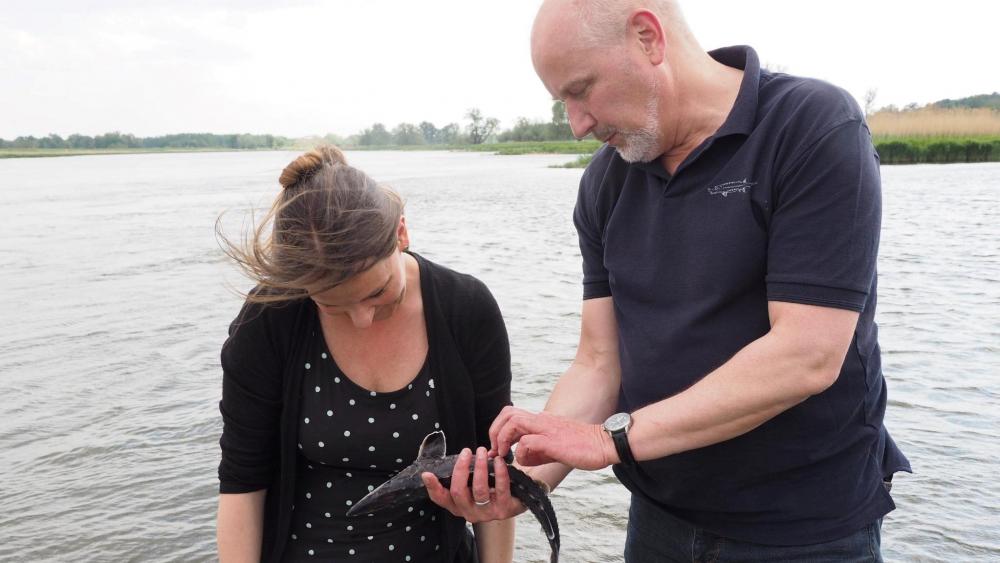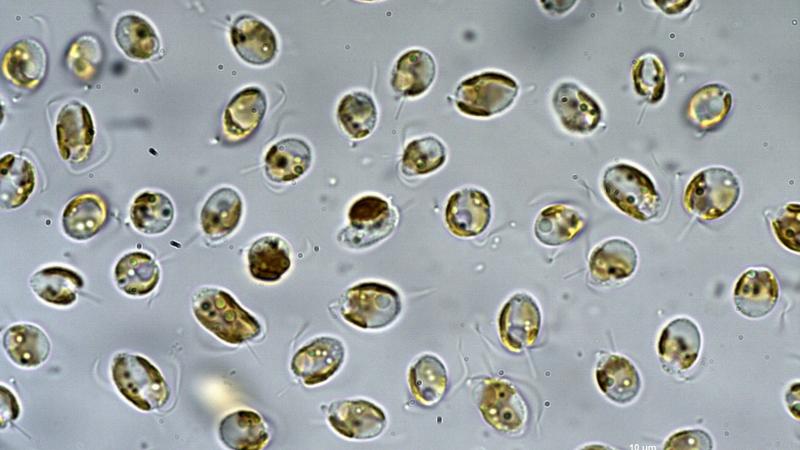
Sahra Damus and Jörn Geßner during sturgeon stocking in Lebus on 11 May 2022. | Photo: Office Sahra Damus
Participants from almost all Baltic Sea states took the opportunity of a joint meeting to gain a personal impression of the practice and perspectives of sturgeon reintroduction in Lebus, Brandenburg. Just in 2019, HELCOM has adopted its sturgeon action plan, in which the recovery programme on the Odra coordinated by IGB is integrated. The plan provides a common framework for international efforts to reintroduce the locally extinct Baltic sturgeon. Among other things, self-sustaining populations are to be established in the Odra river basin. To achieve this goal, about 3.5 million juvenile sturgeon have been released into the river and its tributaries since the first stocking action in 2007. They originate from offspring of a brood stock that was established by IGB with its project partners, the German Society to Save the Sturgeon and the Regional Research Institute for Fisheries and Agriculture Mecklenburg-Western Pomerania. The fish intended to be released are raised in Brandenburg and Mecklenburg-Western Pomerania – also supported by the state of Brandenburg. Once in the river, the young fish spend about two years there before they migrate further into the Baltic Sea. If all works well, the adult fish return to the Odra to spawn at an age of approx. 15 years for the first time.
Odra development not compatible with the goals of HELCOM‘s Sturgeon Action Plan
“Despite the successes so far, those present shared one major concern,” said IGB researcher Dr Jörn Geßner, who coordinates the reintroduction programme and chairs the HELCOM project group EG STUR. “The planned Odra development is not compatible with the goals of the Sturgeon Action Plan. In order to improve the habitat, as requested by the plan, we need more diversity with regard to habitat structures that are subjected to substantial interannual variation in discharge to remain functional. The current plans for the improvement of navigation are heading just the opposite way, towards uniform bank structures, homogenous width and depth as well as the elimination of bottom structures”.
This assessment was shared by Brandenburg state parliament member Sahra Damus (Bündnis 90/Die Grünen), who has been campaigning against the Polish project for years and attended the stocking action on Wednesday. “The sturgeon has been a victim of overfishing, pollution and the development of water bodies, which have caused these wonderful migratory fish to become extinct. For 26 years, however, there have been successful efforts by scientists, practitioners, associations and authorities to reintroduce the sturgeon to the Elbe and Odra rivers and to restore the passability of our waters so that the fish can reach their spawning grounds,” she explained. She said she was glad that the state of Brandenburg financially supports this programme. At the same time, she expressed her indignation that Poland was unilaterally pushing ahead with the Odra river development without waiting for the environmental impact assessment to be completed.
Researchers from IGB, including Jörn Geßner, had already pointed out in 2020 that the planned development endanger the habitat of this and numerous other species in the Odra river. In the meantime, the Brandenburg Ministry of the Environment as well as environmental and nature conservation associations have lodged objections against the project. While the decision date is repeatedly postponed by several months, Poland is already starting with this controversial project.
Download the IGB Policy Brief on the Odra river development >




